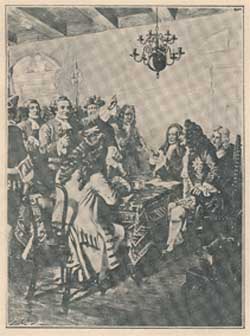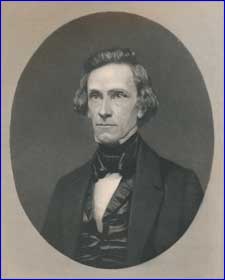You Can’t Keep a Good Presbytery Down
The value and help of a Presbytery full of godly men—men who truly fear the Lord and who seek His will in all things—cannot be overestimated. The whole point of the Presbyterian system is that we should be connected, one to another, in the Body of Christ. Our Lord intends that we should be about the work of building up one another, each of us consistently working at pointing the other to Christ as our only Savior and Lord.
On pages 254-255 of Richard Webster’s work, A History of the Presbyterian Church in America (1857), we read this account which serves to make our point:
The Rev. Eleazer Wheelock, afterwards President of Dartmouth College, wrote from Lebanon, Connecticut, March 13, 1749, to Dr. Bellamy :—
” There are many things that have a threatening aspect on our religious interests in these parts: Antinomian principles, and the Korah-like claims which are the usual concomitants of them; prevailing worldliness and coldness which has become a common distemper among us; growing immorality, justified by the wildness and errors of many high professors; a want of promising candidates for the ministry, and the great difficulty that commonly attends the settling of any, chiefly through the strait-handedness of parishes toward the support of the gospel; the want of a good discipline in our churches, and the difficulty upon many accounts of reviving it, &c. &c. I am fully of the opinion that it is time for ministers to wake up for a redress of these evils; and I can think of no way more likely, than for those, who are in the same way of thinking about the most important things in religion, to join in a presbytery.
Don’t you see that Arminian candidates can’t settle in the ministry? Don’t you see how much those want the patronage of a godly presbytery, who do settle? For want of it, they get broken bones, which will pain them all their days. Would not such a presbytery soon have all the candidates of worth under them, and, consequently, presently most of the vacant churches? Our wild people are not half so much prejudiced against the Scottish constitution as against our own. Many churches in these parts might easily be brought into it, and my soul longs for it. . . .
For my part, I think it high time that men who have been treated as Mr. Robbins (of Branford) was, should have some way of relief, which I am informed was the view of that honest Calvinist who first moved in that proposal. . . . Is there not some reason to hope that hereby there will be a door opened for bringing things into a better posture among the Calvinist party? You know how God has overruled things in the Jerseys.”
Words to Live By:
Now, there is much in that letter that would take more time to explain than we have here today. But reading the broader strokes of Rev. Wheelock’s letter, the lesson to take away concerns the value of a godly presbytery. A good presbytery is first of all a guard against error, setting a biblical standard for who can serve in the pulpit, and so protecting the churches of the presbytery. Moreover, in a godly presbytery, we can expect to find a continued exhortation, one to another, to maintain that high standard.
A good presbytery is a home and refuge to the men who make up the presbytery. Much more than offering mere fellowship, it should be a place to find encouragement, exhortation, and challenge in our high calling as Christians and as under-shepherds of the Lord’s people.
A good presbytery seeks to advance the Kingdom of God, and so seeks to plant new churches, while also building up and encouraging its existing churches. The work of planting new churches is guided by men who have themselves done that same work. They know the pitfalls and errors to avoid. They know the strengths and abilities that will be needed if the work is to prosper.
A godly presbytery will also keep an eye on its established churches, not wanting that any should suffer. I’ve long thought that presbyteries should encourage small and struggling churches by choosing to meet at those locations, with the presbytery covering all the expenses of their time there. Why meet in the prosperous churches when there is opportunity to build up the weaker ones? By meeting in our weaker churches we come to know the people in that church and so are reminded to pray regularly for them. By meeting there we offer a testimony to the watching world, and particularly in a small town, that can be a powerful testimony. Extending the opportunity, the men of presbytery might arrive early to do the work of evangelism in the community. A small conference, open to the public, might be offered on some suitable subject. The presbytery should also strive to include the host congregation in times of worship, fellowship, and prayer.
What else should we find among the qualities of a godly presbytery? And what can you do to bring that about? How can we be actively engaged, day by day, in building up one another in Christ?
“And he gave some to be apostles; and some, prophets; and some, evangelists; and some, pastors and teachers; for the perfecting of the saints, unto the work of ministering, unto the building up of the body of Christ: till we all attain unto the unity of the faith, and of the knowledge of the Son of God, unto a fullgrown man, unto the measure of the stature of the fulness of Christ: that we may be no longer children, tossed to and fro and carried about with every wind of doctrine, by the sleight of men, in craftiness, after the wiles of error; but speaking truth in love, we may grow up in all things into him, who is the head, even Christ; from whom all the body fitly framed and knit together through that which every joint supplieth, according to the working in due measure of each several part, maketh the increase of the body unto the building up of itself in love.”—Ephesians 4:11-16, ASV



![Rev. Samuel Davies [3 November 1723 - 4 February 1761]](https://thisday.pcahistory.org/wp-content/uploads/2012/04/DaviesSamuel.jpg)